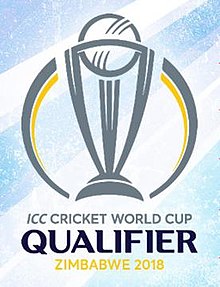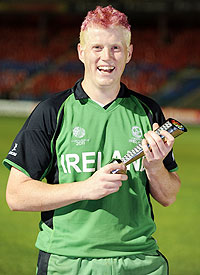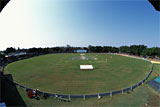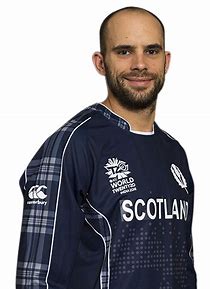The Road to Lord’s in 2019 swings through southern Africa this week, when the 2018 ICC Cricket World Cup Qualifier tournament gets underway in Zimbabwe on Sunday morning. Ten countries, four Test nations and six Associates, will do battle for the right to participate in the 2019 ICC Cricket World Cup in England and Wales.

For many cricket fans, the tournament is a bittersweet one. A festival of cricket such as this should fill the heart with joy, being that a bounty of 50-over cricket is coming our way over the next three weeks. Yet, it is tainted by controversy, and not a little sadness, from the outset due to the machinations of the sport’s “governing” body, the ICC.
Whilst every other sport in the world is looking to expand and develop interest in more markets, the ICC have infamously decided to head in the opposite direction, driven by greed and TV ratings rather than any genuine love of the sport. Instead of expanding the game’s showcase global event to include more Associate nations, the ICC has decided to all but deny them entry to it at all.
The 2019 ICC Cricket World Cup has been slashed to feature just ten teams, down from 14 in the 2011 & 2015 tournaments, and 16 in the 2007 edition. Eight teams have already been guaranteed a place in England next year, leaving the four lowest ranked Full Members and the Associates to scrap for just two remaining qualifying berths. So, for the first time at least two Full Members will not be participating in the World Cup, and it is entirely feasible that no Associate nation will make it all.
That is a crying shame, for the Associates have long been starved of quality opposition against the stronger nations, and the CWC has for many years been the one event where they were afforded that opportunity. That it is taken from them at a time when Associate level cricket is going from strength to strength makes the decision all the more baffling and shameful.
The ICC has granted the two leading Associates of recent years, Ireland and Afghanistan, Full Member status this year, the game is hugely popular in Nepal, whilst Scotland and the Netherlands to name just two have been putting some solid results together on the field and making significant strides to develop infrastructure off it. The time was ripe to really drive growth in these countries, yet all of them could well be looking on from the outside come next year while the bigger teams play a ludicrous 48 games between them over six weeks!
The ICC has also baffling decided not to grant ODI status to two of the teams participating in this month’s tournament, Nepal and the Netherlands, so games featuring those two nations will carry less weight statistically for the teams and their players. Why not simply grant the same ODI status to all games in the tournament, what harm would have ensued? Couple with the again strange decision to not televise or even stream the vast majority of the games, and you start to get the distinct impression that the ICC would prefer that the whole thing wasn’t happening at all!
Ignoring all of that (and I’ll leave my ranting there!) the tournament promises to be an exciting one, with every game counting, some big names of the sport appearing, and the small matter of the ultimate prizes of ICC Cricket World Cup qualification and ODI status at the end.
The format of the tournament is short and sweet compared to the main event it precedes, taking place over just three weeks with as many as four games taking place simultaneously on some days.
The ten teams are divided into two groups of five, each playing the other teams in their group once. The top three sides from each group qualify for the second stage, known as the Super Six. Here, teams’ results against their fellow qualifiers from their group are carried forward from the first round, and the teams play the qualifiers from the other group once each. At the end of this second group, the top two sides qualify for the final and, more importantly, for the 2019 World Cup.
The bottom two sides from each of the two initial groups face play-offs against each other to determine who finishes in seventh to tenth places – these games being of vital importance as the ICC is due to grant ODI status to the top three finishing Associates (plus the Netherlands) for the next four years after the tournament finishes.
So each nation is guaranteed a minimum of six games each, rising to seven for those that qualify for the Super Six, and eight for the finalists.
I preview each group below, as well as marking your cards for some upcoming personal milestones that may be reached as the tournament progresses!
Group A
Group A matches are to be played in the capital Harare, at the Harare Sports Club and the Old Hararians club.

West Indies
The Windies arrive at the tournament as one of the joint favourites, being as they are a Full member and with the best pedigree of all ten participating nations. That a twice-World Cup winning side (and current T20 world champion) finds itself needing to qualify at all is a result of some terrible ODI form in the last few years and an impasse with key players that has seen some of the Caribbean’s best cricketers overlooked or self-exiled from selection. They failed to qualify for last year’s Champions Trophy in England, and will be desperate not to miss out in the same country again next year.
They are buoyed for this tournament by the return of several big names to the fold, including self-styled “Universe Boss” Chris Gayle, Marlon Samuels and quick bowler Kemar Roach.

Some personal milestones to look out for the Windies:
Kemar Roach – Fast bowler Roach needs just one wicket to bring up 100 in ODIs
Jason Holder – the skipper needs nine more wickets to bring up his century in the format.
Marlon Samuels – if the West indies progress all the way to the final, and Samuels plays all eight games along the way, he will move on to 200 ODI appearances.
Ireland
As a then Associate nation, Ireland qualified for the last three World Cups going back to 2007, famously inflicting some of the biggest upsets the tournament has ever seen in the process – beating Pakistan in 2007 and England in 2011. Now a newly-installed Full Member, and with a first Test match taking place in May, the men in green will be highly driven to keep their fine record going and qualify for the big show in neighbouring England.
Recent results have not been as strong, and with an ageing (although highly experienced) squad, one senses qualification may be a battle, but they certainly will not give up on that coveted spot without a fight.
A few key personal marks to watch out for:
Kevin O’Brien – the hero of that famous win against England in 2011 needs just 88 runs to bring up 3,000 in ODIS for Ireland

Niall O’Brien – Kevin’s brother Niall will notch up 100 appearances in ODIs if Ireland qualify for the Super Six, he plays in all games, and Nepal don’t qualify for the Super Six from Group B (because Netherlands and Nepal don’t have ODI status.)
The Netherlands
By virtue of winning the World Cricket League Championship in 2017, the Netherlands have been granted ODI status, commencing after this tournament, and will also participate in the inaugural ICC ODI league alongside the 12 Full members when it kicks off in 2020, guaranteeing them regular games against higher ranked sides.
So exciting times lie ahead for the Dutch, regardless of what happens in Zimbabwe, but nonetheless they will be keen to qualify for the World Cup for the fifth time and first since 2011.
Their squad has been bolstered by the return of several plays playing top-class cricket overseas such as captain Peter Borren, Essex’s County Championship winning captain Ryan ten Doeschate and Roloef van der Merwe.
Papua New Guinea
The Barramundis will be looking to qualify for their first major tournament. A more realistic target might be to hold on to their ODI status by finishing as one of the top 3 associate nations. Form against fellow associates has not been strong of late finishing fourth in the WCL in 2017, being on the wrong side of a bilateral series defeat to Scotland, as well as losing both warm ups in Zimbabwe over the last week, so they will look to improve in the next three weeks.
United Arab Emirates
The UAE secured their spot in the Qualifier by winning the recent WCL Division 2 tournament in Namibia, beating fellow qualifier Nepal in the final. Their main aim in this tournament will be to keep hold of their current ODI status for another four years.
One personal milestone that may be realised comes in the form of Shaiman Anwar, who needs 182 runs to become the first UAE player to notch up 1,000 ODI runs.
Group B
Group B matches take place at in Zimbabwe’s second city, Bulawayo at the Queens Sports Club and the Bulawayo Athletic Club.

Zimbabwe
Being a Full member and with the benefit of home advantage, the Zimbabweans will be one of the teams favoured by some to take a coveted qualifying spot for England. Graeme Cremer’s men have had a mixed time of late – winning a bilateral series in Sri Lanka in 2017 but losing against Afghanistan and failing to make it to the final of the Bangladesh tri-series also featuring Sri Lanka.
Their ranks have been bolstered this year by the return from Kolpak stints in England of star keeper-batsman Brendan Taylor and quick bowler Kyle Jarvis, and they will hope that experience and the improved form of Hamilton Masakadza and Sikandar Raza will be enough to get them to the final.
A few personal marks that are in play in the tournament:
Sean Williams – recalled to the squad for the tournament, batting all rounder Williams needs just 53 runs to bring up 3,000 in ODIs
Craig Ervine – batsman Ervine needs just nine runs to notch up 2,000.
Hamilton Masakadza – the big opener needs just three ODI appearances to move from sixth place in his country’s appearance list to fourth, passing Alistair Campbell and coach Heath Streak in the process
Afghanistan
It is a sign of their remarkable progress over recent years that Afghanistan are likely favourites for the tournament, having also attained Full Member status in 2017 and looking forward to a maiden Test against India in June.
They have had mixed form in fairness, winning an ODI series against Zimbabwe and drawing in the West Indies in the last 12 months, alongside a series defeat to Ireland in the UAE in late 2017. But they are buoyed by the presence of a phalanx of young and hugely impressive spin bowlers that are more than a match for anyone on their day, especially in Zimbabwe’s likely spin-friendly conditions.
Keep a special eye on the mercurial Rashid Khan

Afghanistan’s vice-captain will, at just 19 years of age, likely become the youngest captain in international cricket history when he deputises for usual skipper Ashgar Stanizkai (out with appendicitis) in the opener against Scotland. Nothing should surprise anyone from Khan, who sits proudly atop the ICC’s ODI and T20I bowler rankings and is courted by franchises the world over, such has been his meteoric rise over the last two years.
Khan also needs just 14 wickets to bring up 100 in ODIs – few would bet against him getting them.
Mohammad Nabi and Dawlat Zadran – fellow bowlers Nabi and Dawlat need 5 and 10 wickets respectively to bring up their 100s too.
Scotland
In the last 12 months, Scotland notched up a bilateral ODI victory over a Full member for the first time, beating Group B rival Zimbabwe in Edinburgh in June 2017. That result and coming second in the WCL to the Netherlands will fill them with confidence that they can at least qualify for the Super Six stage of this tournament – but having appeared in three of the last five ICC world cups, they will be hoping for more.
Kyle Coetzer – already his country’s highest ever ODI-scoring batsman, skipper Coetzer will be looking to add the 277 runs he needs to bring up 2000 for Scotland in ODIs.
Hong Kong
Deprived of top players not available for this tournament, such as JJ Atkinson and Mark Chapman, the latter having opted to now play for New Zealand, Hong Kong’s chief aim will be to emerge with their ODI status intact so they can continue to progress at the highest associate level.
Nepal
One of the fastest upcoming nations in Associate cricket, Nepal secured their berth at this qualifier by finishing second in the WCL Division 2 tournament in Namibia earlier this year. With huge support at home in the Himalayan nation, obtaining ODI status will be their main goal from this tournament, and with superstar Sandeep Lamichhane, recently awarded an IPL contract, in their ranks few would bet against them causing an upset or two.










